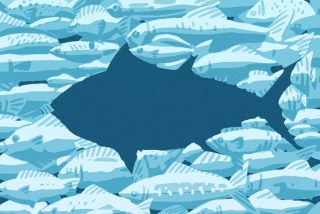Saving the bluefin tuna
- Share via
Europeans love to diss the selective environmentalism of Americans. And they have a point, given this nation’s lax attitude about many toxic substances and its late arrival to the anti-global-warming club. But when it comes to wallet issues, Europe can be right up there in its unwillingness to save the planet. Some of the most heated opposition to ending the overfishing of Atlantic bluefin tuna has come from the continent, especially in the region along the Mediterranean with a big bluefin fishing industry.
But a shrinking industry. Overfishing to feed a huge appetite for the tuna prized as sashimi -- this isn’t the stuff in cans sporting a logo of a wiseguy with gills -- has nudged the Atlantic bluefin toward extinction. The Atlantic bluefin swims fast, up to 23 miles an hour for short distances, but not fast enough to escape its current situation as one of the most threatened fish in the seas. The population is less than a fifth of what it was in the 1970s, when the popularity and price of bluefin soared. Most of that loss has occurred within the past 10 years.
This weekend, during the last days of its meeting in Brazil, the International Commission for the Conservation of Atlantic Tunas will consider the Atlantic bluefin’s fate. The commission, which oversees catches of tuna, has placed stiffer limits on bluefin fishing in the past, but not nearly enough to slow its precipitous decline. Even European countries are likely to agree to another reduction in the catch, but in truth, this isn’t enough. Commercial fishing of the Atlantic bluefin must stop altogether, and enforcement against rampant illegal fishing must be increased, until the population stabilizes and then recovers.
That’s a tough message for an industry that already faces bad times, but the bluefin business should be as alarmed as environmentalists at how quickly the species is disappearing. On Wednesday, the chairman of the commission’s research committee predicted that the fish had a 20% chance of recovery if the quotas from last year remain in place, and only a 50% chance of success even if the catch is reduced significantly.
Regardless of the outcome in Brazil, another international group with a much bigger membership, the Conference of the Parties, will consider a proposal to list the Atlantic bluefin as an endangered species when it meets in Qatar in March. Such a listing would end most international trade in the fish, reducing illegal catches by shrinking the market. Countries that buy and sell heavily will protest, but such a move would benefit both the bluefin and the nations that want to catch it -- and eat it -- in the future.
More to Read
Sign up for Essential California
The most important California stories and recommendations in your inbox every morning.
You may occasionally receive promotional content from the Los Angeles Times.












